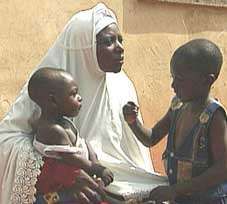NATIONAL FAMILY PLANNING CAMPAIGN - NIGERIA
 Preparations for Rotary’s nation wide family planning campaign that will cover all 36 states and the Federal Capital Territory (FCT)—announced in the Spring 2018 edition of Fragile Earth—are in full swing. Having committed to the co-financing the project, the German Federal Ministry of Economic Cooperation and Development (BMZ) proposed a two-phase process of implementation. A budget of roughly 500.000€ was offered for Phase I by the BMZ to fulfill our request for assistance in facilitating an expansion of the existing successful project in Nigeria. The necessary matching contribution of 35% was attained through a Global Grant (GG) in collaboration with the Rotary Foundation (TRF). This was possible through the utilization of both District Designated Funds (DDFs) and club donations, the amounts of which are respectively matched in full and in half by TRF. Phase I, which can begin in the third quarter after the approval of the GG, encompasses the expansion of our family planning and education campaign, as well as that of our programming efforts to improve quality control and logistics through digital data collection. Additionally, in half of the Nigerian states, medical staff will be trained as consultants of family planning and in the administration of modern, long-lasting contraceptive methods. A second Global Grant has also been secured for the second phase of the project, set to be implemented in 2019. For this phase, matching donations from other district DDFs and clubs will be necessary to secure the co-financing of the BMZ. Clubs and districts from Austria and Switzerland have already expressed their interest in contributing to the project. Preparations for Rotary’s nation wide family planning campaign that will cover all 36 states and the Federal Capital Territory (FCT)—announced in the Spring 2018 edition of Fragile Earth—are in full swing. Having committed to the co-financing the project, the German Federal Ministry of Economic Cooperation and Development (BMZ) proposed a two-phase process of implementation. A budget of roughly 500.000€ was offered for Phase I by the BMZ to fulfill our request for assistance in facilitating an expansion of the existing successful project in Nigeria. The necessary matching contribution of 35% was attained through a Global Grant (GG) in collaboration with the Rotary Foundation (TRF). This was possible through the utilization of both District Designated Funds (DDFs) and club donations, the amounts of which are respectively matched in full and in half by TRF. Phase I, which can begin in the third quarter after the approval of the GG, encompasses the expansion of our family planning and education campaign, as well as that of our programming efforts to improve quality control and logistics through digital data collection. Additionally, in half of the Nigerian states, medical staff will be trained as consultants of family planning and in the administration of modern, long-lasting contraceptive methods. A second Global Grant has also been secured for the second phase of the project, set to be implemented in 2019. For this phase, matching donations from other district DDFs and clubs will be necessary to secure the co-financing of the BMZ. Clubs and districts from Austria and Switzerland have already expressed their interest in contributing to the project.
The success of RFPD’s family planning campaign in Nigeria is well documented, earning the support and collaboration of The Rotary Foundation, national and municipal governmental bodies, as well as that of local religious and traditional leaders. The first RFPD family planning project—implemented in two Nigerian districts between 1995-2000—realized an increase in contraceptive use prevalence from 3% to 27%. Since 2007, comprehensive maternal health projects have been executed—with midwives trained in modern family planning methods—in 65 hospitals across eight states. And ongoing contributions have allowed 8.284 Women to be fitted with modern contraceptive coils by trained personnel. As a result of this impressive record, the pilot project “Postpartum Family Planning” is being replicated in both Pakistan and Ethiopia, financed by respective $35,000 grants. There is still much to be gained by building upon these successes and expanding the range of this proven strategy to encompass all of Nigeria.
Focused on the most populous country in Africa, this family planning campaign fulfills the important function of reducing flight pressure by improving local conditions, strengthening the role of women, fostering peace and ‘empowerment’, and contributing to the since 1968 existing human right to family planning. Furthermore, professional family planning of this kind is a crucial prerequisite for the attainment of the demographic dividend in Nigeria and for the success of the Marshall Plan with Africa. As German Minister of Development Gerd Müller explained at the beginning of the current legislative period in the Bundestag: “the worldwide population explosion necessitates new answers, including through family planning”. If family planning is not promoted in Nigeria now, new estimates from the UNFPA (United Nations Population Fund) suggest that the population will grow yearly by six million people over the next 12 years, putting further strain on the local environment and economy. Accordingly, voluntary family planning is one of Rotary’s main areas of focus and is crucial for a socially and ecologically sustainable development. Please support us by asking your club for a donation of at least €500 for this significant Global Grant.
|